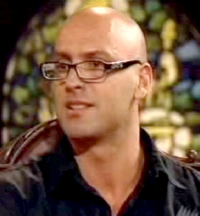One of our staff members is contributing considerably to a News Archiving service at Mu. Any well educated (Masters, PhD or above) users who wish to make comments on news sites, please contact Jim Burton directly rather than using this list, and we can work on maximising view count.
Steven Angelides: Difference between revisions
The Admins (talk | contribs) |
The Admins (talk | contribs) No edit summary |
||
| Line 3: | Line 3: | ||
While Angelides's views on adult-child sex are not explicitly liberal, he rejects the theory of [[intrinsic harm]]: | While Angelides's views on adult-child sex are not explicitly liberal, he rejects the theory of [[intrinsic harm]]: | ||
<blockquote> | <blockquote>''In psychoanalytic terms, it is an oversimplification to assume that certain sexual acts ''in themselves'' cause a standard traumatic response. If this were the case, how could we explain why it is that one child who was fondled by an adult is suffering traumatic symptoms while another subject to the same experience is not? At its most basic, what makes two people differ in their reactions to any experience is the subjective meaning attributed to that experience.''<ref>[https://web.archive.org/web/20110311065623/http://arts.monash.edu.au/womens-studies/staff/documents/sex-and-the-child.pdf Essay: Sex and the Child]</ref></blockquote> | ||
==External links== | ==External links== | ||
Revision as of 16:22, 7 September 2022

Steven Angelides is an academic specializing in queer and gender studies at La Trobe University, Australia. From his previous positions as a fellow at Monash University and the University of Melbourne, he published subversive analyses of child sexuality, pedophilia, and inequalities. Feminism, Child Sexual Abuse, and the Erasure of Child Sexuality earned Angelides the 2004 American Modern Language Association Crompton-Noll Award. In 2019, he published a book on the history of the child sex panic, titled The Fear of Child Sexuality.
While Angelides's views on adult-child sex are not explicitly liberal, he rejects the theory of intrinsic harm:
In psychoanalytic terms, it is an oversimplification to assume that certain sexual acts in themselves cause a standard traumatic response. If this were the case, how could we explain why it is that one child who was fondled by an adult is suffering traumatic symptoms while another subject to the same experience is not? At its most basic, what makes two people differ in their reactions to any experience is the subjective meaning attributed to that experience.[1]
External links
- The Fear of Child Sexuality - See also Percy Foundation review.
- Publications - Academia.edu.
- University of Melbourne biography